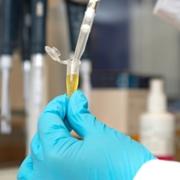Gene Expression under UV-Based Advanced Oxidation Process Treatment in Pseudomonas aeruginosa strain PAO1
Student: Noa Aharoni
Advisors: Prof. Eliora Ron and Dr. Hadas Mamane
Student: Noa Aharoni
Advisors: Prof. Eliora Ron and Dr. Hadas Mamane
Advanced oxidation process (AOP) is a widespread application for micro-pollutant disinfection of water. Previous studies show the efficiency of ultraviolet (UV)-based AOP combined with hydrogen peroxide (UV/H2O2) as a pretreatment strategy for biofilm control in water, resulting from the destructive effect of the treatment on bacterial cells. Here we present studies on the effect of AOP treatment on gene expression as determined by several molecular tools.
The work was carried out using Pseudomonas aeruginosa PAO1 as a model organism for bacteria that form biofilms. Exposure of P. aeruginosa PAO1 to UV/H2O2 treatment resulted in up-regulation of a number of genes, including two genes (PA3237 and PA0848) whose expression is significant and specific to UV/H2O2 as compared to UV or H2O2 treatments alone. These two genes have not been annotated and their function is currently unknown.
Enhanced expression of these genes is also obtained in water containing Natural Organic Matter (NOM). The up-regulation of these two genes is probably caused by the formation of radicals, as it is abolished in the presence of the radical scavenger tert-botanol (TBA).
The up-regulation of the PA3237 promoter can also be detected using a reporter gene fused downstream to the promoter. This finding raises the possibility of using such genetic constructs for developing biosensors for monitoring and controlling AOP treatment in water plants and industry.




